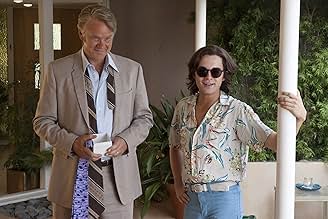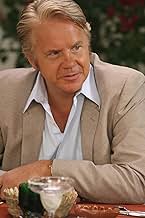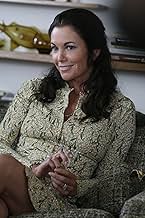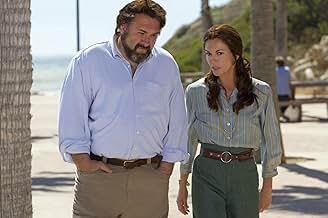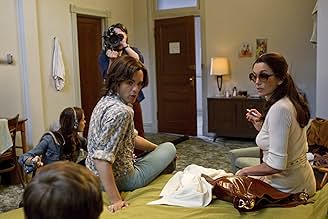VALUTAZIONE IMDb
6,5/10
4143
LA TUA VALUTAZIONE
Uno sguardo dietro le quinte della realizzazione della prima famiglia americana come soggetto di un reality show televisivo.Uno sguardo dietro le quinte della realizzazione della prima famiglia americana come soggetto di un reality show televisivo.Uno sguardo dietro le quinte della realizzazione della prima famiglia americana come soggetto di un reality show televisivo.
- Regia
- Sceneggiatura
- Star
- Vincitore di 1 Primetime Emmy
- 7 vittorie e 34 candidature totali
Recensioni in evidenza
CINEMA VERITE tries very hard to justify the trend it began in the 1970s by having a camera crew move into the household and private life of the well-to-do Loud family in Santa Barbara. The idea of a docudrama about a docudrama is acceptable as a flag for the obsession with Reality TV shows spawned by this experiment. Unfortunately the writing (by David Seltzer - apparently based on the book written by Pat Loud 'A Woman's Story' about the experience) is spotty and the recreation of (1971 when the 'series' was filmed and 1973 when it hit the television screens) reminds us how boring that time frame was. The direction by Shari Springer Berman and Robert Pulcini imitates the dreary 'spontaneity' of live action drama the film addresses. It plods, tripping on the cables for the cameras placed inside the home of this sad story.
Documentary producer Craig Gilbert (James Gandolfini) devises a concept for PBS he calls 'An American Family' and searches for a family that does not depict the happy-wappy family of staged productions but instead inters the privacy of an American family, examining all the aspects of that institution. He selects the Loud family, particularly because he sees Pat Loud (Diane Lane) as an early women's rights activist able to say truths others might avoid. Gilbert paces his documentary to unveil the dirt that hides behind the scenes - motivated to prod Pat to discover Bill (Tim Robbins) her husband's infidelity, which led her to seek a divorce. The Louds have two sons involved in the dream of becoming a rock band, a daughter in the throes of discovering teenage love, and a gay son Lance (Thomas Dekker) who has moved to New York to live a raucous life without the approval of his father but one visited by Pat without complete acceptance. The film crew consists of a married couple - Alan Raymond (Patrick Fugit) and Susan Raymond (Shanna Collins) - who reluctantly agree to film even the most embarrassing scenes of the film. The gradual crumbling of the Loud marriage - not helped by either Gilbert or by Pat's 'friend' Val (Lolita Davidovich) who is actually another one of Bill's affairs - is what producer Gilbert wants to record, and he succeeds. The Louds end their marriage, Lance later dies of AIDS, and the other children have minor successes in their lives. But the overriding feeling of this film is showing how the inquisitive media can be destructive in attempting to share reality with the world at large. And so began the glut of reality shows that yearly grow more irreverent in respecting privacy.
Diane Lane brings moments of brilliance to her role as the manipulated Pat and James Gandolfini is given the opportunity to push his acting chops. The problem is that we all know the quasi-tragic story on which this film is based, and making us witness it again is less than entertaining. It is disturbing.
Grady Harp
Documentary producer Craig Gilbert (James Gandolfini) devises a concept for PBS he calls 'An American Family' and searches for a family that does not depict the happy-wappy family of staged productions but instead inters the privacy of an American family, examining all the aspects of that institution. He selects the Loud family, particularly because he sees Pat Loud (Diane Lane) as an early women's rights activist able to say truths others might avoid. Gilbert paces his documentary to unveil the dirt that hides behind the scenes - motivated to prod Pat to discover Bill (Tim Robbins) her husband's infidelity, which led her to seek a divorce. The Louds have two sons involved in the dream of becoming a rock band, a daughter in the throes of discovering teenage love, and a gay son Lance (Thomas Dekker) who has moved to New York to live a raucous life without the approval of his father but one visited by Pat without complete acceptance. The film crew consists of a married couple - Alan Raymond (Patrick Fugit) and Susan Raymond (Shanna Collins) - who reluctantly agree to film even the most embarrassing scenes of the film. The gradual crumbling of the Loud marriage - not helped by either Gilbert or by Pat's 'friend' Val (Lolita Davidovich) who is actually another one of Bill's affairs - is what producer Gilbert wants to record, and he succeeds. The Louds end their marriage, Lance later dies of AIDS, and the other children have minor successes in their lives. But the overriding feeling of this film is showing how the inquisitive media can be destructive in attempting to share reality with the world at large. And so began the glut of reality shows that yearly grow more irreverent in respecting privacy.
Diane Lane brings moments of brilliance to her role as the manipulated Pat and James Gandolfini is given the opportunity to push his acting chops. The problem is that we all know the quasi-tragic story on which this film is based, and making us witness it again is less than entertaining. It is disturbing.
Grady Harp
These reality show movies are hard to watch. I did not hear about the Louds before. But it would have been interesting to watch what went wrong with America's sweetheart family. However, the script did not have enough punch to hold the interest for the entire time. James Gandolfini is such a good actor. He made an unlikeable character tolerable. Diane Lane was not quite believable as a gullible, wronged woman. Tim Robbins was watchable, however something was missing and I just didn't believe in his character. It started out fine, had a lot of potential when it moved to Manhattan, but somewhere down the second act, it lost its grip. Wish it had the momentum going somehow. Alas, it didn't end too well for me.
Surprisingly successful HBO film, which takes on the tricky multi-layered task of making a fictionalized docudrama about the making of "An American Family" a 10 hour PBS documentary that was the direct forerunner the surreal and semi-real world of 'reality television' we know today.
James Gandolfini plays James Gilbert, who has the brilliant idea to study a 'typical' American Family on film, almost as if it were an archaeological document. But of course no family is 'typical' (particularly the upscale Loud family), and all sorts of sticky moral, ethical and cinematic walls are crashed into. How objective can a documentary really be? What is, or should be off-limits of a prying camera? How much do the personalities and needs of the film-makers effect the behavior and choices subjects, subtly or sometimes very dramatically?
It also explores questions about family, as did the original series, but with the value of the passage of years to give context and distance. What is normal? Who are the heroes and villains in the complexities of family life? Are things ever that simple? Why do so many of us want to be seen, known? Or at least think we do?
It's very impressive that an 86 minute film can address so many of these questions so intelligently, entertainingly, disturbingly and ultimately movingly. The acting is all solid, with Diane Lane giving what may be the most impressive performance of her career, disappearing into the role of Pat Loud, the confused, self-searching mother.
While one could validly argue that there was more to explore (e.g. why was this series such a phenomenon? Why are we so driven to watch the train wrecks of other's lives?) this film does a terrific job of self-awarely playing with multiple layers and meanings of 'reality'. Not least when we briefly see footage of the real family cut in. Not surprising from these filmmakers, who also played with various levels of drama vs. reality so well in "American Splendor".
James Gandolfini plays James Gilbert, who has the brilliant idea to study a 'typical' American Family on film, almost as if it were an archaeological document. But of course no family is 'typical' (particularly the upscale Loud family), and all sorts of sticky moral, ethical and cinematic walls are crashed into. How objective can a documentary really be? What is, or should be off-limits of a prying camera? How much do the personalities and needs of the film-makers effect the behavior and choices subjects, subtly or sometimes very dramatically?
It also explores questions about family, as did the original series, but with the value of the passage of years to give context and distance. What is normal? Who are the heroes and villains in the complexities of family life? Are things ever that simple? Why do so many of us want to be seen, known? Or at least think we do?
It's very impressive that an 86 minute film can address so many of these questions so intelligently, entertainingly, disturbingly and ultimately movingly. The acting is all solid, with Diane Lane giving what may be the most impressive performance of her career, disappearing into the role of Pat Loud, the confused, self-searching mother.
While one could validly argue that there was more to explore (e.g. why was this series such a phenomenon? Why are we so driven to watch the train wrecks of other's lives?) this film does a terrific job of self-awarely playing with multiple layers and meanings of 'reality'. Not least when we briefly see footage of the real family cut in. Not surprising from these filmmakers, who also played with various levels of drama vs. reality so well in "American Splendor".
In 1971 an all American family from Santa Barbara in California were chosen, seemingly at random, to take part in a TV experiment. It was to become the world's first reality TV show called "An American Family" and its stars, the Loud family – both by name and at times by nature, were to become national phenomena.
But to get to legendary status the show's producer, Craig Gilbert, had a pretty hard sell to the board of TV company PBS who were reluctant, to say the least, to commit to the show and began to baulk at the cost of production as the film stock costs (in particular) began to mount.
Their concern was about the "view-ability" of the show and whether it would find an audience. They needn't have worried because what gradually emerged was a tale of a swinging misogynist father (Tim Robbins), a hopeless and helpless (but sultry in Gilbert's opinion) Mom played brilliantly by Diane Lane and a screamingly gay son, Lance, played gleefully by Thomas Dekker. Not to mention a looky-likey Rolling Stones band fronted by the other two boys.
But it's what's going on in the mind of Producer Gilbert (played masterfully by James Gandolfini with a very unlikely full beard and absolutely no gangster element whatsoever to draw on) that is the meat of the movie. Well, I say a movie but it's actually a documentary set within a drama, about a reality TV documentary that turns out larger than life than any drama.
At points we see side by side comparisons between the "real" family and the 2011 actors. It's uncanny. Gandolfini manipulates all sides as he makes the "action" more and more interesting but in doing so contributes to the family meltdown and the confidence of his crew. It's terrific.
I don't think this ever made it to cinema, it's an HBO production, but it's great and I saw it last night on Sky Atlantic so is likely to be repeated at some time. If it is tune in because it's a little gem.
But to get to legendary status the show's producer, Craig Gilbert, had a pretty hard sell to the board of TV company PBS who were reluctant, to say the least, to commit to the show and began to baulk at the cost of production as the film stock costs (in particular) began to mount.
Their concern was about the "view-ability" of the show and whether it would find an audience. They needn't have worried because what gradually emerged was a tale of a swinging misogynist father (Tim Robbins), a hopeless and helpless (but sultry in Gilbert's opinion) Mom played brilliantly by Diane Lane and a screamingly gay son, Lance, played gleefully by Thomas Dekker. Not to mention a looky-likey Rolling Stones band fronted by the other two boys.
But it's what's going on in the mind of Producer Gilbert (played masterfully by James Gandolfini with a very unlikely full beard and absolutely no gangster element whatsoever to draw on) that is the meat of the movie. Well, I say a movie but it's actually a documentary set within a drama, about a reality TV documentary that turns out larger than life than any drama.
At points we see side by side comparisons between the "real" family and the 2011 actors. It's uncanny. Gandolfini manipulates all sides as he makes the "action" more and more interesting but in doing so contributes to the family meltdown and the confidence of his crew. It's terrific.
I don't think this ever made it to cinema, it's an HBO production, but it's great and I saw it last night on Sky Atlantic so is likely to be repeated at some time. If it is tune in because it's a little gem.
This film speaks volumes about the ethical dilemmas doc-makers (and "reality TV" producers) all-too-frequently face. Some choose to do the ethical thing and tell an unvarnished truth, most are happy to sell their soul for ratings. Strong filmmaking from the folks who brought us American Splendor and have now once again cut to the heart of the American Dream. If you watch "reality TV" and believe it, this is mandatory viewing. Diane Lane will break your heart, Tim Robbins shatters deeply held delusions about the Playboy/Esquire lifestyle and James Gandofini's strong performance is a scream in the dark urging us to dump the junk TV and watch more substantial fare. This is great American filmmaking.
Lo sapevi?
- QuizIn the scene where Lance Loud is on the phone with his family, he reads a media description of himself and his "flamboyant, leech-like homosexuality". That's a direct quote from an article written for The New York Times by Anne Roiphe. She made equally scathing remarks about the entire Loud family.
- BlooperThe Louds' Mercedes has a California plate with the number style 1AAA000. These plates did not appear until 1980.
- ConnessioniFeatured in The Tonight Show with Jay Leno: Episodio #19.129 (2011)
- Colonne sonoreDream A Little Dream
Written by Fabian Andre, Gus Kahn & Wilbur Schwandt
Performed by Cass Elliot (as Mama Cass)
Courtesy of Geffen Records under license from Universal Music Enterprises
I più visti
Accedi per valutare e creare un elenco di titoli salvati per ottenere consigli personalizzati
Dettagli
- Data di uscita
- Paese di origine
- Lingua
- Celebre anche come
- Rạp chiếu phim Verite
- Aziende produttrici
- Vedi altri crediti dell’azienda su IMDbPro
- Tempo di esecuzione
- 1h 26min(86 min)
- Colore
- Mix di suoni
- Proporzioni
- 1.78 : 1
Contribuisci a questa pagina
Suggerisci una modifica o aggiungi i contenuti mancanti


